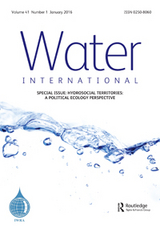
Groundwater governance through institutional bricolage? Participation in Morocco’s Chtouka aquifer contract
Houdret, AnnabelleExternal Publications (2022)
in: Water International 47 (4), 565-582
DOI: https://doi.org/10.1080/02508060.2022.2049545
Open access
Controlling groundwater use has become one of the most urgent and difficult issues in common-pool resource governance. This article analyses an aquifer contract in Morocco as an innovative, participatory approach to the problem. Cleaver’s concept of institutional bricolage allows us to understand how its implementation affected and interacted with existing social institutional arrangements for water use. The findings confirm that an awareness of insufficient rules is a precondition for new governance arrangements. They reveal how power relations and social institutions influenced the implementation of the aquifer contract. Finally, they show how social and cultural affiliations shape the implementation.

